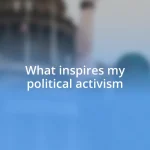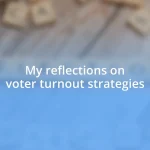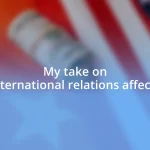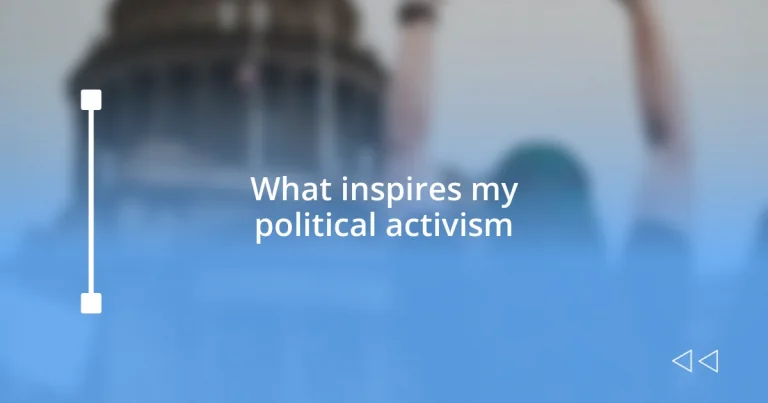Key takeaways:
- Personal experiences, such as witnessing struggles for healthcare access and participating in climate change debates, drive individuals toward activism and highlight the necessity of advocacy.
- Historical movements, such as the Civil Rights Movement and the suffrage movement, serve as foundational influences that inspire ongoing efforts for equality and justice, demonstrating the importance of learning from the past.
- Building networks through collaboration and digital engagement amplifies activism, as shared stories and collective efforts create a stronger impact and promote lasting change in communities.
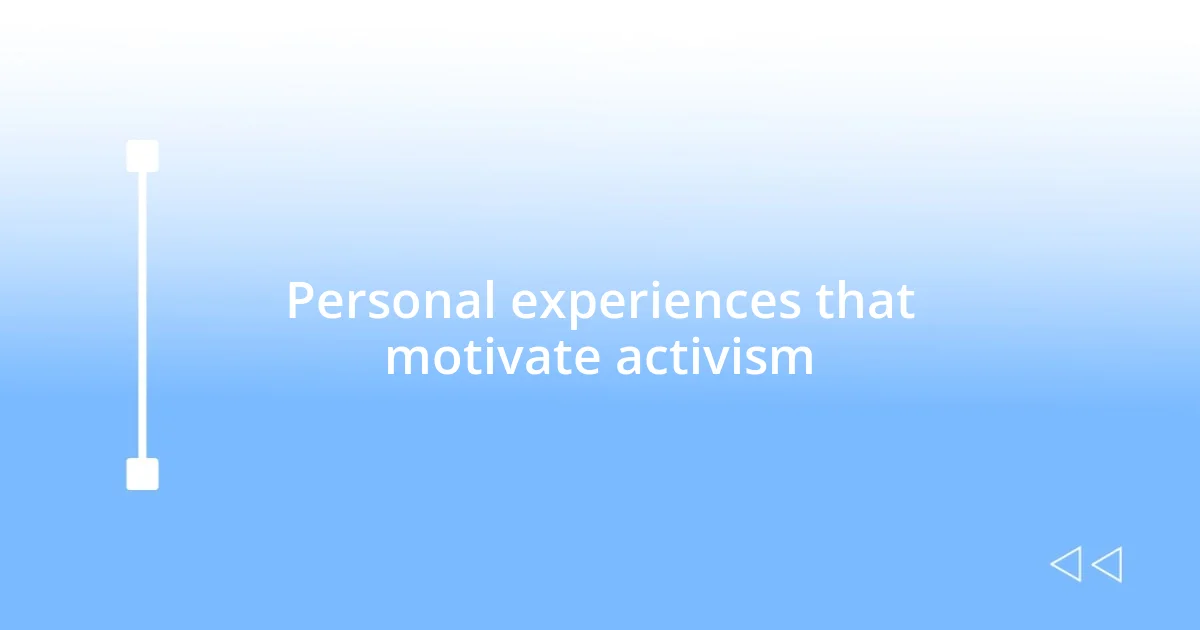
Personal experiences that motivate activism
One experience that deeply impacts my activism roots back to a high school debate I participated in regarding climate change policies. As I stood there, presenting facts and statistics to my peers, I could feel this wave of urgency wash over me. It dawned on me that the choices we make today could pave the way—or the roadblocks—for future generations. How could I sit back and not contribute to this discussion?
I vividly remember a community event where I met a woman who shared her struggle for healthcare access after losing her job. Her raw emotion struck a chord with me. I began questioning my own privilege and realized that it’s not enough to just be aware of injustices; one must take action to uplift those voices that are often unheard. Isn’t it our responsibility to advocate for those who can’t?
Another moment that galvanized my activism was watching a local protest on social media. Seeing the sheer determination and solidarity of those advocating for social justice made me think: if they can brave the elements and stand up, what’s stopping me? This feeling of collective power sparked something within me and reaffirmed my belief that even small acts of activism can create ripples of change.
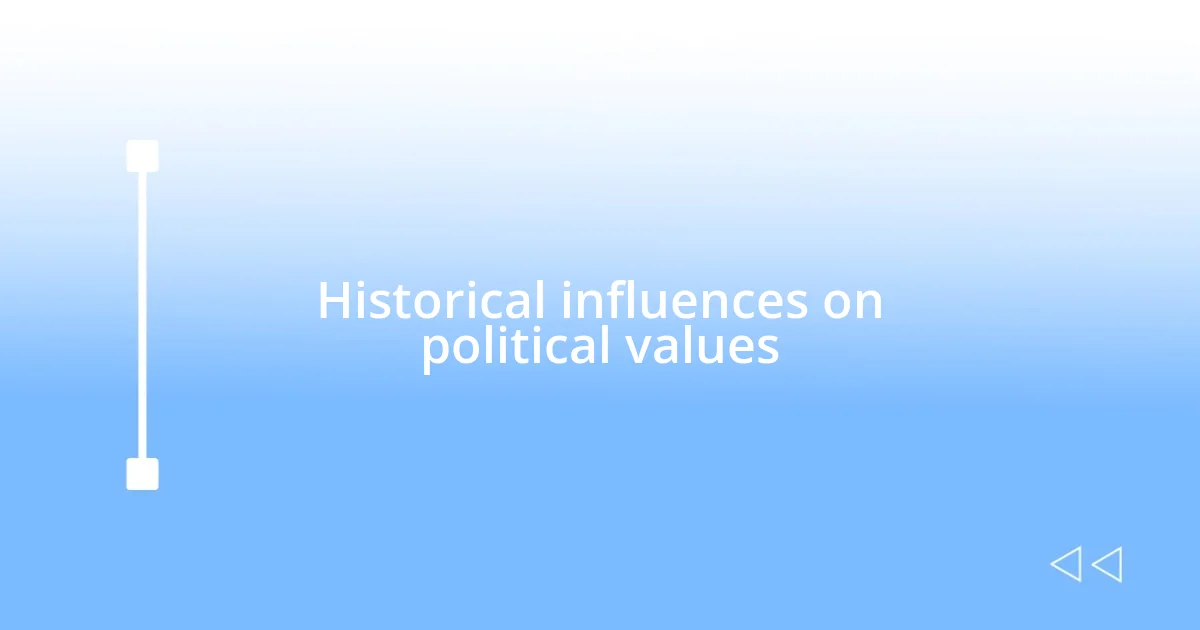
Historical influences on political values
Reflecting on historical influences really sheds light on how our political values evolve. For instance, the Civil Rights Movement of the 1960s not only highlighted systemic injustices but also inspired countless individuals, including myself, to champion equality and justice. As I learned about figures like Martin Luther King Jr., I was moved to think about the sacrifices made for civil liberties. It made me realize that fighting for rights is a legacy we continue to build upon today.
- The suffrage movement emphasized the fight for women’s rights, inspiring many to advocate for gender equality.
- The anti-apartheid movement showcased the power of unity against oppression, motivating global activism.
- Historical protests, like Stonewall, ignited the LGBTQ+ rights movement, reminding us that visibility and voice are crucial.
- Global events, like the fall of the Berlin Wall, drastically shifted political landscapes, influencing my belief in collective action.
These moments in history not only shape our understanding but also compel us to consider the role we play in the ongoing narrative of political activism.
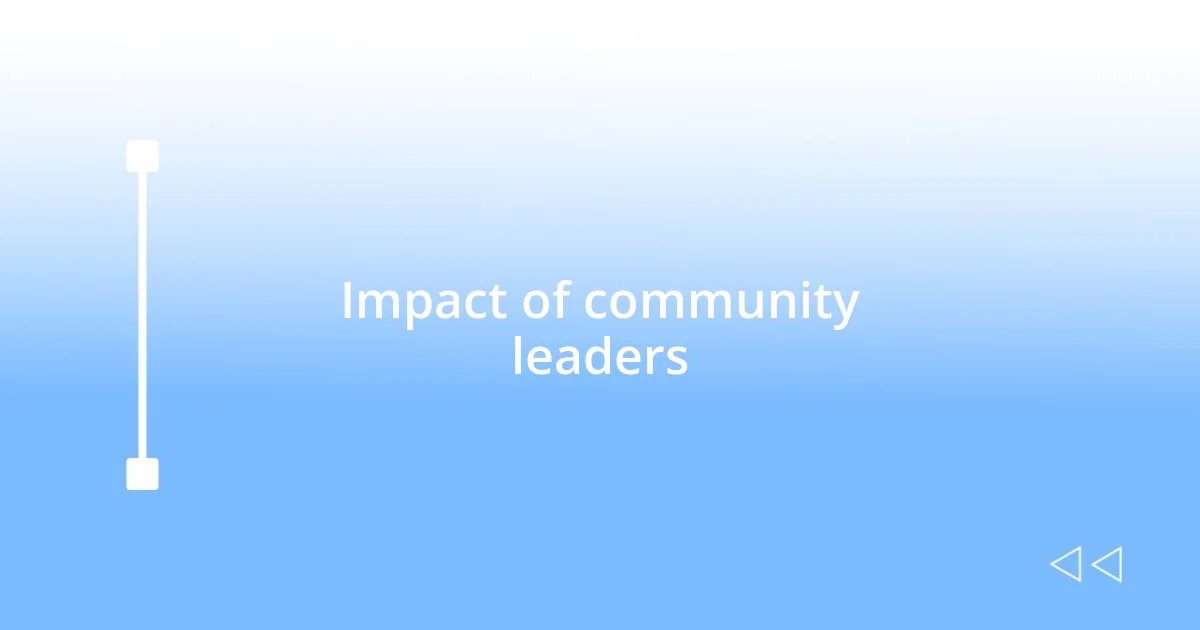
Impact of community leaders
The influence of community leaders on my activism is something I often reflect upon. I recall a local leader who organized a grassroots initiative to gather our neighborhood’s concerns about environmental policies. Her unyielding passion was infectious. By seeing her rally people together, I felt a spark of inspiration—a compelling reminder of how one person’s efforts can mobilize an entire community toward change. Isn’t it fascinating how effective leadership can galvanize collective action?
I’ve also encountered leaders who focus on education and youth empowerment, which has deeply resonated with me. One instance involved a community workshop led by a local activist who shared her journey from a troubled background to becoming a mentor for younger generations. Listening to her story, I felt a wave of hope; it was an embodiment of resilience that challenged me to reflect on my role in fostering change. Her journey pushed me to realize that advocating for education isn’t just a political choice; it’s a moral imperative.
Lastly, there’s something powerful about leaders who foster inclusivity. During a public forum I attended, a community leader of immigrant descent shared her experiences navigating the system. She emphasized the importance of listening to diverse voices. Her words resonated within me, prompting me to consider how activism is strengthened by inclusion. It reminded me that every story matters and every voice deserves to be amplified. Isn’t that what true activism is about—creating spaces where all can stand together?
| Type of Leader | Impact on Activism |
|---|---|
| Community Organizer | Mobilizes collective efforts and inspires community action |
| Youth Mentor | Empowers the next generation, fostering resilience and hope |
| Inclusivity Advocate | Highlights the importance of diverse voices in activism |
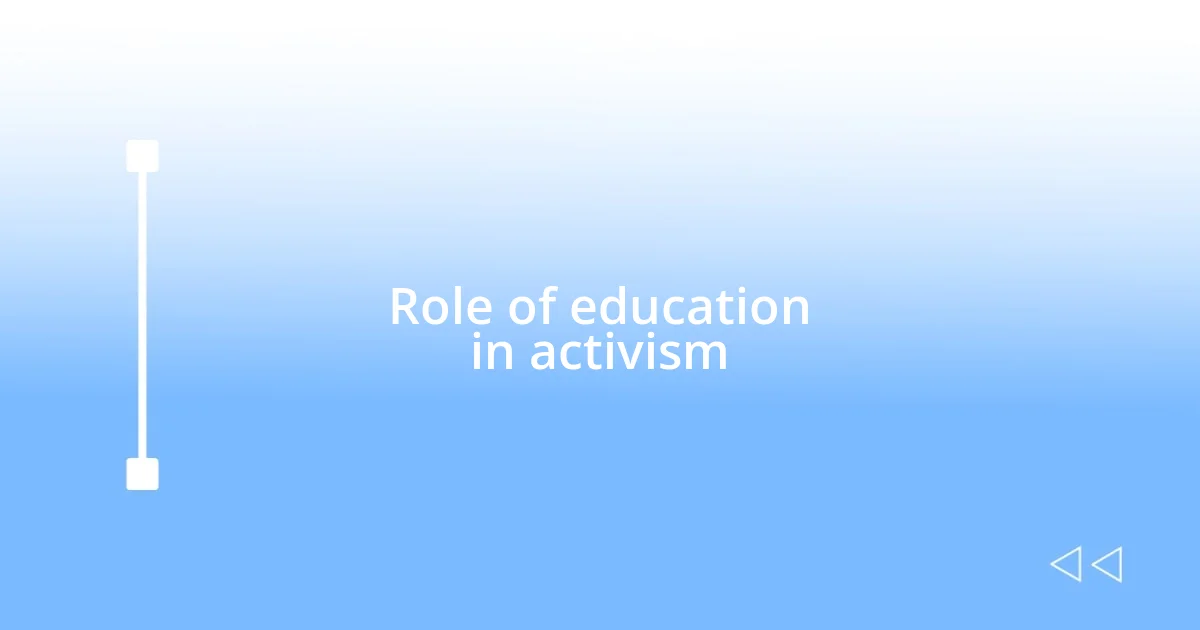
Role of education in activism
Education plays a crucial role in shaping our understanding of activism. I vividly remember my time in a community college course where we explored social injustices. The discussions we had, often led by passionate instructors, ignited a fire within me. It made me realize that knowledge isn’t just about facts; it’s about awakening a critical consciousness that pushes us to question the status quo. Have you ever experienced that moment when a single lesson transforms how you see the world?
One powerful example of this came during a project where we studied the impact of historical movements on contemporary issues. I researched local responses to police brutality and found myself uncomfortable yet compelled to delve deeper. It was empowering to connect the dots between historical injustices and current events. I found that viewing activism through an educational lens gave me the tools to articulate my thoughts and share them confidently with others. Isn’t it extraordinary how education can turn raw emotion into informed action?
I’ve also witnessed firsthand how educational initiatives can foster activism among youth. At a high school workshop I attended, facilitators encouraged us to discuss pressing social issues openly. The energy in that room was palpable. It was as if we were planting seeds of change right then and there. This interaction reinforced my belief that education is more than traditional learning. It cultivates empathy and encourages young activists to find their unique voices. What if every educational institution prioritized activism in their curriculum? Imagine the potential for a generation committed to social justice!
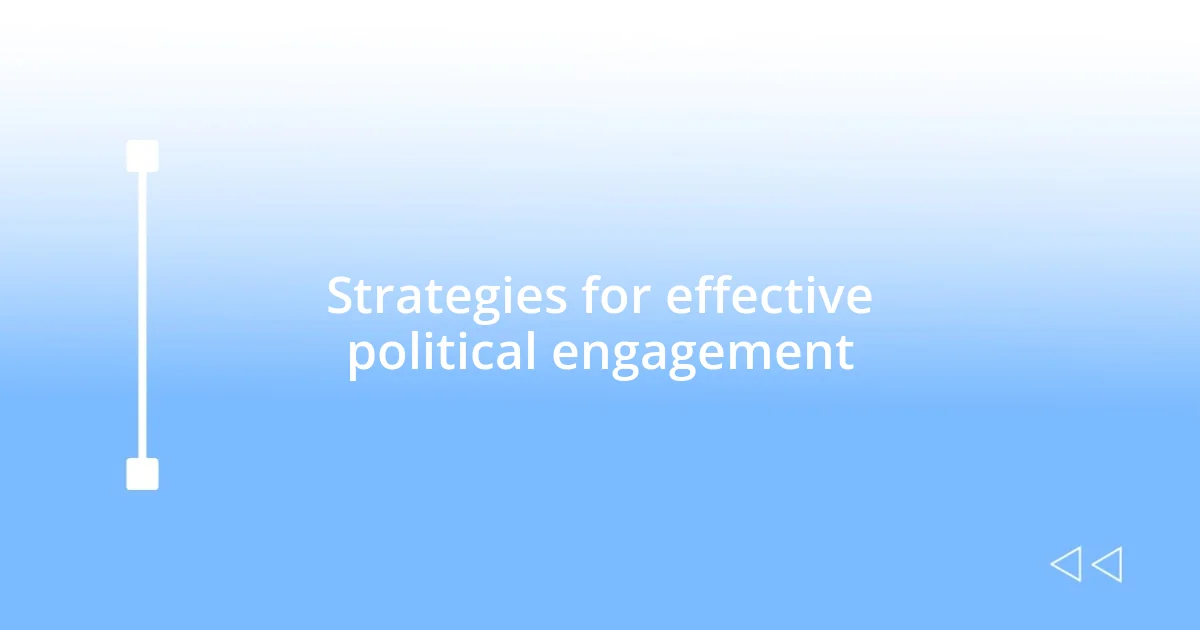
Strategies for effective political engagement
One strategy I’ve found effective in political engagement is storytelling. I experienced this vividly at a recent rally where several people shared their personal narratives about the impacts of climate change. Each story painted a vivid picture of urgency and resilience, which resonated deeply with the audience. It made me ponder: How can we connect with political issues if we don’t understand the human experiences behind them? Storytelling bridges that gap, making complex issues more relatable and motivating others to take action.
Another powerful tool in political activism is digital engagement. During the pandemic, I noticed how social media became a lifeline for activists. Participating in online campaigns allowed me to engage with a wider audience, sparking conversations that often led to real change. I remember one particular campaign where we raised awareness about voting rights, and the engagement was colossal! Isn’t it astounding how a simple tweet can mobilize a group to rally behind a cause? The power of digital platforms is undeniable—they can amplify our voices and foster community, no matter where we are.
Moreover, collaboration with local organizations can strengthen our activism. Volunteering with a nonprofit that focuses on social justice opened my eyes to the profound impact of collective efforts. I recall organizing a community clean-up, which not only beautified the neighborhood but also brought people together, fostering a sense of ownership and pride. It made me realize that when we pool our resources and talents, we become force multipliers for change. How often do we forget that we don’t have to do it alone? Working alongside others not only amplifies our efforts but cultivates relationships that can fuel long-term commitment to the cause.
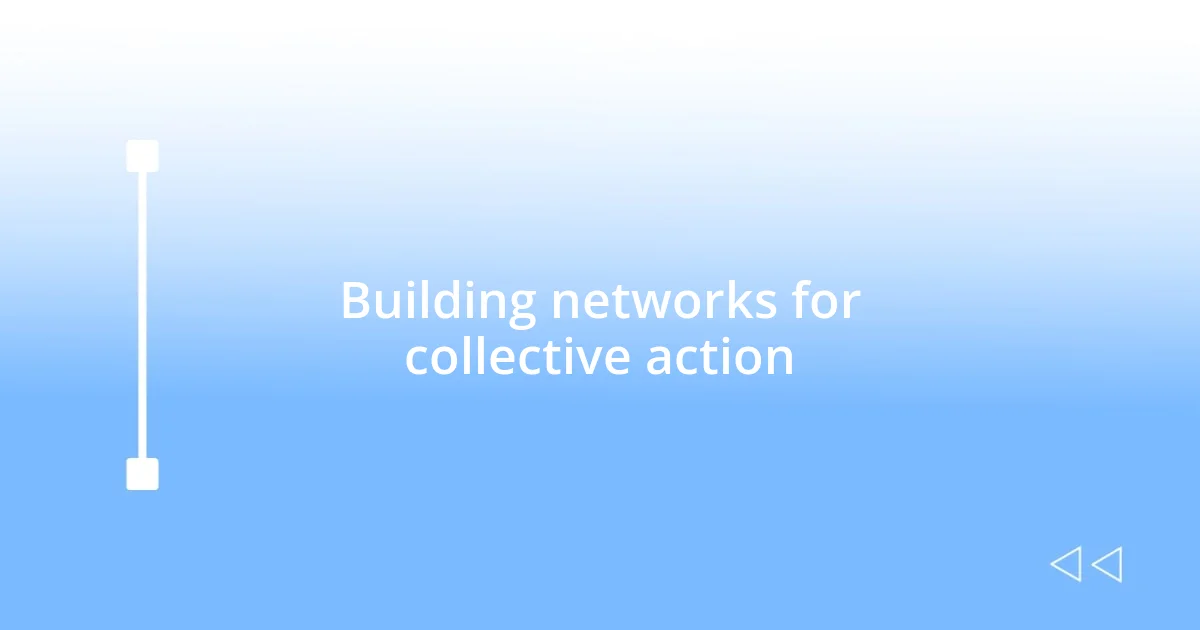
Building networks for collective action
Building networks is essential for fostering collective action in our communities. I still recall the time I joined a grassroots organization focused on housing rights. It was eye-opening to see how quickly we could mobilize when everyone brought their unique skills to the table. This experience made me wonder: what if we could amplify our voices by tapping into not just our local networks, but also connecting with other activists across the country? The possibilities are endless.
When I think about building networks, I remember a powerful experience during a coalition meeting with various activist groups. As we shared our experiences, I felt a surge of energy in the room. It was electrifying to realize we were all stitching together a broader tapestry of resistance. This sense of solidarity was inspiring. It begs the question: how often do we underestimate the power of collaboration? Our collective strengths create a ripple effect that can drive monumental change.
I also appreciate the role that social media plays in this network-building process. I’ve participated in online forums where people share not just their victories, but also their struggles. One time, after posting about my frustration with local policies, I was overwhelmed by the supportive responses from people I had never met. It reinforced my belief: we are stronger together. Isn’t it remarkable how a simple act of reaching out can lead to new alliances and shared ambitions? Building these networks gives us the courage to persist, knowing we are part of something greater.
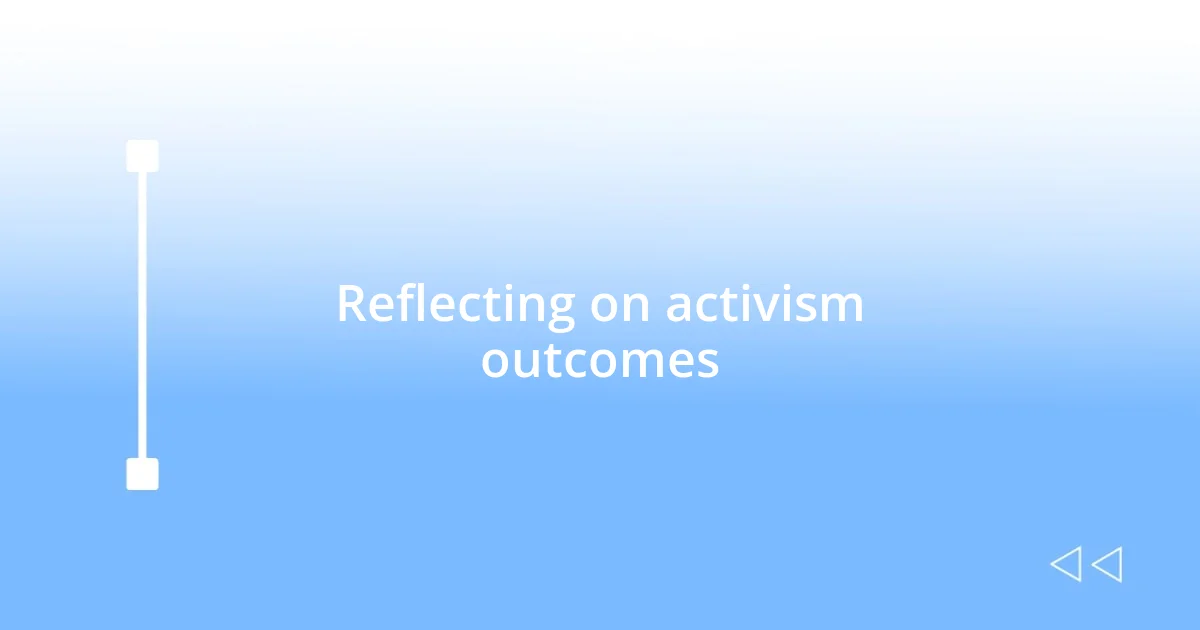
Reflecting on activism outcomes
Reflecting on the outcomes of our activism is crucial for understanding our impact. I remember a particularly challenging campaign where we aimed to influence local legislation. After months of hard work, we finally secured a minor victory: the city council agreed to hold a public forum on the proposed changes. In that moment, I felt a surge of pride. It made me question, what if we hadn’t persisted? Each small outcome can spark further dialogues that redefine possibilities.
Sometimes, the outcomes aren’t as clear-cut. I participated in a protest that garnered significant media attention but didn’t lead to immediate policy changes. Initially, it felt disheartening. However, weeks later, I started hearing conversations about our cause in everyday settings, like coffee shops and community events. It hit me that even without immediate results, we planted seeds of awareness and discussion. Isn’t that an essential part of activism—the understanding that change takes time and often starts far away from the front lines?
I’ve also been struck by how personal connections can create unexpected outcomes. At a local fundraiser, I met a young woman whose life had been profoundly affected by the issues we were fighting for. Hearing her story made me realize the deeper emotional currents at play in our activism. It sparked a collaborative project that brought our community together in ways I hadn’t anticipated. How often do we overlook the human element in our efforts? These reflective moments show that the outcomes of activism are not just about tangible results but also about fostering connections and igniting collective consciousness.



